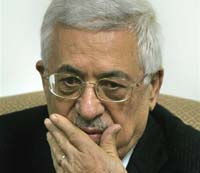Israel will not intervene in Hamas-controlled Gaza
Calm appeared to be returning to Gaza on Friday morning after five days of brutal fighting between rival Palestinian forces. Traffic was back on the streets and few armed men were visible, in contrast to the running battles of the past few days.

In the latest wave of bloodletting in the crowded and chaotic territory, Hamas gunmen defeated their rivals from Fatah with surprising swiftness, seizing their security installations and marching once-feared Fatah fighters down the street shirtless and with hands raised. The violence left more than 90 people dead.
The Palestinian territories have essentially been split into two parts. Gaza is now under the control of Hamas, an Islamist movement with close ties to Syria and Iran. The West Bank, home to most of the Palestinian population, is dominated by the more moderate Fatah, which has ties to Israel and the West.
Safe in his office in the West Bank town of Ramallah, Palestinian President Mahmoud Abbas of Fatah declared a state of emergency Thursday, firing the Hamas-led government and its prime minister, Ismail Haniyeh.
But whatever power Abbas once wielded in Gaza disappeared with the collapse of his forces there. Haniyeh brushed off Abbas' decision, calling it "hasty" and refusing to leave office. The situation was "not suitable for unilateral decisions," Haniyeh said.
"The era of justice and Islamic rule has arrived," Hamas spokesman Islam Shahawan announced.
An Israeli Cabinet minister said however that despite calls from the right for Israel to reoccupy the Gaza Strip, which it quit in 2005, Israel would not move in to confront Hamas, which is sworn to destroy it.
"There is no intention to re-enter that swamp, Gaza, in this situation. At this point, Israel has no reason to intervene," minister Meir Sheetrit told Israel Radio.
Fearful that Hamas' momentum could spread to the West Bank, Fatah went on the offensive there. In the city of Nablus, Fatah men shot dead a Hamas member early Friday, Hamas said, the first to be killed in the West Bank. The Al Aqsa Martyrs' Brigades, a violent Fatah offshoot, claimed responsibility.
On Thursday, angry Fatah militants threw office furniture out a third-story window of the Palestinian parliament building in Ramallah, then set fire to the office of three Hamas lawmakers.
But in Gaza, Thursday was a day of major victories for Hamas and its backers in Iran and Syria - and of devastating setbacks for Fatah. In one particularly humiliating scene, masked Hamas fighters marched agents of the Preventive Security Service out of their headquarters, arms raised in the air, stripped to the waist and ducking at the sound of a gunshot.
Hamas TV said the building would be turned into an Islamic college.
Abbas said he would install a new government, replacing the now-defunct Hamas-Fatah coalition formed just three months ago. Abbas' decrees won't reverse the Hamas takeover of Gaza, but might enable Fatah to consolidate its control over the West Bank and pave the way for two separate Palestinian governments.
Because Fatah has recognized Israel's right to exist and signed on to past peace agreements, the international community's boycott of the Palestinian territories in the wake of Hamas' electoral successes may no longer apply to the West Bank - just to Gaza.
Some 2 million Palestinians live in the West Bank, while 1.4 million reside in Gaza.
Subscribe to Pravda.Ru Telegram channel, Facebook, RSS!




